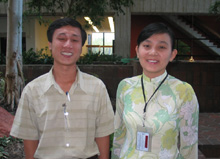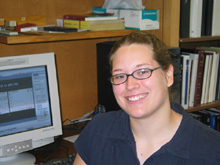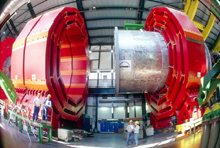 | Wednesday, July 27, 2005 |
|
Wednesday, July 27 11:00 a.m. Research Techniques Seminar - Curia II Speaker: M. Ellis, Imperial College, London Title: A Scintillating Fibre Tracker for MICE THERE WILL BE NO FERMILAB ILC R&D MEETING THIS WEEK 3:30 p.m. DIRECTOR'S COFFEE BREAK - 2nd Flr X-Over THERE WILL BE NO FERMILAB COLLOQUIUM THIS WEEK
Thursday, July 28 |
|
Extended Forecast |
Secon Level 3 |
|
Wednesday, July 27 Italian Wedding with Meatballs Diner Style Patty Melt $4.85 Chicken a la Mer $3.75 Beef & Broccoli $3.75 Greek Chicken Panini with Feta Cheese $4.85 Sicilian Style Pizza $3.00 Grilled Chicken Bowtie in a Tomato Cream Sauce $4.85 The Wilson Hall Cafe now accepts Visa, Master Card, Discover and American Express at Cash Register #1. |
|
Lunch Wednesday, July 27 Salad with Peanut Dressing Soy and Ginger Beef with Noodles Summer Fruit Medley
Lunch
Dinner
Chez Leon Menu |
| Fermilab Today is online at: http://www.fnal.gov/today/ Send comments and suggestions to today@fnal.gov Fermilab Today archive Fermilab Today PDF Version Fermilab Result of the Week archive Fermilab Safety Tip of the Week archive Linear Collider News archive Fermilab Today classifieds Subscribe/Unsubscribe to |
|
From the Interactions News Wire, July 26, 2005 Berkeley Lab Press Release: A gold mine for science It is the deepest mine in the United States and was the site of the single largest gold deposit ever found in the Western Hemisphere. What has, for the past 125 years, been known as the Homestake gold mine, outside the town of Lead, in the Black Hills of South Dakota, could become the home of an enormous underground multipurpose national scientific laboratory.
The National Science Foundation has announced that the Homestake gold mine is one of two finalists in the competition to determine the future location of the Deep Underground Science and Engineering Laboratory (DUSEL). The Homestake underground lab proposal, which is being led by Kevin Lesko, a nuclear physicist with the U.S. Department of Energy’s Lawrence Berkeley National Laboratory (Berkeley Lab), will receive a $500,000 grant from NSF to go forward with a conceptual design for DUSEL.
|
|
Fermilab Summer Students:
Focus on Amanda Weinmann | ||
| ||
|
Amanda Weinmann will begin her third year at St. Mary's University this fall,
but until then she is hard at work in the Neutron Therapy program here at Fermilab.
A double major in Bio-Physics and Engineering Physics, Weinmann applied for
a summer internship at the lab with almost no idea of what she would be
doing. "I included my interest in Bio-physics in the application," Weinmann
recalled, "but the first I heard about Neutron Therapy was here at the lab."
Weinmann is one of seven summer students in the Science Undergraduate Laboratory Internship (SULI) program at Fermilab. Spending a large part of her summer in front of a computer, Weinmann is working on the program "Geant4," developed and used mainly at CERN. The program is designed to model different geometries, and Weinmann is applying this capability to digitally replicate a patient's anatomy. "We're modeling the patient by taking CT scans and using those densities to determine what is bone, or muscle, or other tissues," she said. "Then we can superimpose the image from the Geant4 simulation onto a CT scan and see where the neutron beam's energy will be deposited before doing any work on the patient." Accurately targeting a tumor is a considerable challenge in Neutron Therapy. Weinmann's work will help increase its effectiveness by making sure the maximum amount of energy possible is directed at the tumor and not at any adjacent tissue.
Although she has seen some individual cells treated with Neutron Therapy,
Weinmann has not worked with any patients this summer. "My favorite part of
the internship is the collaboration," she says. "It's a big part of research,
and this is my first experience with that." Although unsure of a specific
field, Weinmann hopes to make a career of medical research. Her workload
will remain heavy after her stay at Fermilab, as she attempts to balance
indoor and outdoor track with preparation for the MCATs.
|
|
DISUN Connects Universities to the LHC
Through Grid Computing | ||
| ||
|
Scientific research and grid computing at universities across the country
took a big step forward recently with an award of $10 million from the
National Science Foundation to the Data Intensive Science University Network.
DISUN will allow over 200 physicists at U.S. universities to study the
fundamental properties of particles and forces by providing access to data
from the Compact Muon Solenoid experiment at the Large Hadron Collider
at CERN in Geneva, Switzerland.
DISUN is a collaboration of five U.S. universities that will develop, deploy and operate a distributed computing infrastructure that will allow university physicists to analyze data collected on another continent, and researchers in other sciences to strengthen participation in national and international research activities.
|
|
Fermilab Today Search Engine Temporarily Not Available Due to technical problems, the Fermilab Today search engine is temporarily not available. Thank you for your patience while the problem is being fixed.
International Folk Dancing |


